Oct 2, 2017
Food, environment and human health, local economy and resilient communities
By Elena Karoulina
Executive Director of Sustainable Solano

Image from Pixabay
When was the last time you had Solano-grown produce on your dinner table? The most possible answer is ‘never’, unless you grow your own food in your garden or your backyard food forest. It’s a very unusual situation for a Bay Area county that is still largely agrarian, at least in the land use patterns.
Sustainable Solano is embarking on a new project to bring more local food to our communities and to connect our local farmers, chefs, and residents with the gifts of our land and with each other.
At the very end of September we received great news from the United States Department of Agriculture (USDA): our proposal to further our vision by developing a business plan for Solano Community Food Centers was selected for funding! Annually, USDA funds about 14% of grant applications for local food projects, and we are honored to earn support on a federal level.
What is a Community Food Center? It is a hub for local food activities: CSAs deliveries, cooking classes, community education, and large kitchens where chefs and community members can cook wholesome nutritious meals. Larger Community Food Centers can include a food co-op.
Although Solano County produces close to $354 million worth of agricultural products and exports these products to more than 40 countries, only a fraction of that amount remains in the county due to weak distribution system, lack of sales outlets and somewhat low interest in local food. You can hardly find any Solano-grown products in our farmer markets, stores and restaurants. Small farmers struggle to hold on to their land and to connect with local customers.
Where do we buy local food? People who can afford it obtain their local ag products in the markets outside our county: Napa, Sonoma, Berkeley (thus spending local money outside our local communities). Some cities in Solano are blessed with Community Supported Agriculture, but not many people know about this option and take advantage of it. People with low means have to go without local fresh food at all. Solano is a county of commuters, and unfortunately, the only option available for families on a go is fast-food restaurants and convenience stores (you cannot find local food there!).
We pay dearly for this lack of access to local food with our health: Solano County is among the sickest counties in the nation. Obesity, diabetes, heart disease rates are above national average in our home county.
Food, human health, the environment and local economies are all interconnected; by creating a network of city-based Community Food Centers, there is potential to re-envision and re-construct Solano County’s food system so that it works for everyone in the local food supply chain.
Sustainable Solano has partnered with researchers at UC Davis, Solano County Department of Agriculture and Department of Public Health to conduct a feasibility study, develop an effective business plan, and outline implementation for local food businesses that aggregate, process and distribute locally-produced, healthy food products. Our big vision is the environmentally and economically sustainable, equitable local food systems in Solano County.
We are looking for urban and rural farmers, chefs and local food activists interested to implement this vision. We’d love to hear from you with your comments, suggestions, reflections, and offers to help. Please email directly to me at elena@sustainablesolano.org
Let’s make it happen! I am looking forward to meet all of you at the official launch of the program on Wednesday, October 25, at 7 pm, at Benicia’s Heritage Presbyterian Church (doors open at 6 pm). Please join our Advisory Board members Dr. Feenstra and Dr. Campbell in the conversation about the future of food and why local resilient food system is so important. Come meet the project team and all of us interested to bring this vision to reality.
Dec 15, 2016
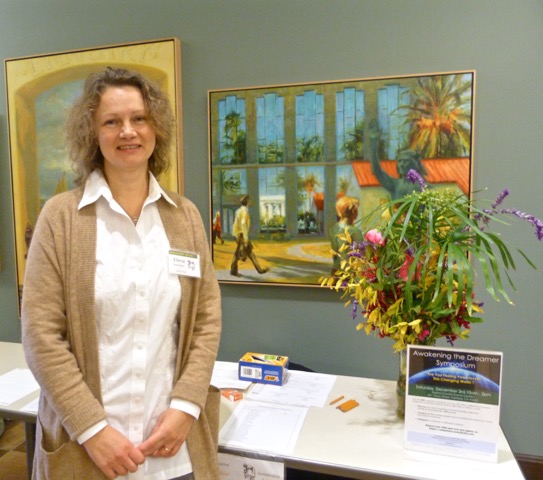
Dear friends of Sustainable Solano,
As I am looking back at the eventful and transformative year of 2016, I would like to express my deepest gratitude to all people who helped co-create Sustainable Solano: the Board, our volunteer leadership team, our funders and supporters, and all of you who made a personal commitment to make a difference, to participate in something bigger than ourselves, to nurture heart-based initiatives for the good of the whole.
In 2017 we will continue to refine and shape the vision for the organization, to deepen our understanding of our current situation and to develop strategies to help making Solano County more environmentally and economically sustainable, socially just and personally fulfilling place to live and work.
We will continue with meaningful conversations in the community, beginning with a seven-week “Game Changer Intensive” offered by Pachamama Alliance as a follow up to the Awakening the Dreamer Symposium. Everyone can participate in this program! Our goal is to provide opportunities for face-to-face meetings in Solano County allowing us to deepen the connections we felt so profoundly with each other at the Symposium and to engage with each other in new and existing initiatives that facilitate change at the local level and beyond. Learn more and to register.
Our sustainable landscaping efforts will continue with monthly tours of Benicia demonstration permaculture food forests, installation of demonstration gardens in Fairfield and Vallejo, and a series of talks and workshops in Benicia, Fairfield and Vallejo – watch for regular updates on our calendar.
We invited professional landscapers, both established and new, to explore our Land Caretakers Program. Sustainable Landscapers Association of Solano County is forming now – please email info@sustainablesolano.org if you are interested in learning more.
Calling all the players in Solano local food movement to get to know each other and to join our efforts to create a robust, healthy, inclusive local food system in the county. We are planning to have a Solano Local Food Summit in the spring of 2017. If you are interested to learn more, please email info@sustainablesolano.org.
For cooking classes and talks on healthy, local food throughout the county, please check our calendar regularly (and let us know if you would like to promote your efforts of brining wholesome local food to our communities through our website and newsletter).
I am looking forward to see you at these upcoming programs and events. Please let me know if you have suggestions, ideas or questions. I wish you a peaceful and restful holiday season!
In gratitude,
Elena Karoulina
Executive Director
Sustainable Solano
Oct 10, 2016
Save the Date: Awakening the Dreamer Symposium Comes to Solano County

Are you ready for a deeply transformative experience? On December 3rd, 2016 from 10am-2pm, the Awakening the Dreamer Symposium comes to Solano County at Solano County Events Center in Fairfield, offering a dynamic multimedia half-day workshop that uses videos, personal reflection, and group activities to engage people everywhere as the co-creators of an environmentally sustainable, socially just, and spiritually fulfilling world.
Register for this free event.
Imagine:
- Having everything we need to create a sustainable, just, and fulfilling world
- Understanding the unique contribution you can make in your community
- Feeling hopeful about the future of our planet and species
You don’t have to just imagine these things–together, we can make them real. Participants will leave the Symposium empowered to take clear steps to embody their vision for a better world, and having established new connections to work with others on common issues for the common good of the whole.
The Symposium is developed and distributed by The Pachamama Alliance, a San Francisco-based nonprofit started at the invitation of indigenous people of Ecuador’s Amazon rainforest. Through the Symposium and other workshops, they work to generate widespread awakening at the grassroots level and a transformation of our worldview, such that humanity becomes committed to restoring and protecting the environment and moves towards social justice and spiritual fulfillment.
For even more details on the Symposium and The Pachamama Alliance, please visit:
www.pachamama.org
Pachamama Alliance Workshops and Events
Awakening the Dreamer: A Transformative Workshop for People and Planet (Video):
https://youtu.be/n8zaUjvCJOY
This Symposium will be open to anyone who wishes to take practical steps to bring about transformation to the environmental, social and spiritual presence of humanity on the earth. We hope you join us!
Jul 24, 2016
By Kathleen Huffman, LCT Graduate
When I was asked to write a short piece about the “Land Caretakers” program, at first I was at a loss as to what to write about. So much has happened in the course of my time with the program that to try and get it all into one article is difficult at best. What an amazing adventure these classes have been. Some classes are hands on, and we get to install urban food forests in various places around the city. Some sessions are “off campus” and are wonderful field trips to visit various people and places. And then some days are opportunities to learn to run a profitable business.

David Mudge Consulting
First we spent weekends learning so much about the fascinating world of sustainable gardens and bio-swales with the delightful David Mudge , who’s easy demeanor and delightful personality, made a day behind a shovel and pick ax just about the best day ever! David is always eager to answer any questions about sustainable gardening and has wonderful stories to tell as well!
We then went to UC Davis where we spent 2 days learning about how to select, house and care for chickens. While there we visited with experts in all areas of poultry science…from pedigree to pests, from the eggs formation to its final inspection by the “egg police”. Even for someone who grew up taking care of the family chickens was so much more I was able to learn.
We also spent several weekends learning about “wise water” and how to “slow it, sink it and spread it”. We all watched as we adjusted water flow out of gutters and into swales. We crawled under houses to learn about laundry to landscape applications and running pipe in some very small places, my claustrophobia not withstanding…..
We also attended a week long gray water installers course lead by the amazing Laura Allen, author of “The Wise Water Home”, where we were not only taught the history, policy and processes of gray water installation, but we made lots of wonderful new friends as well.
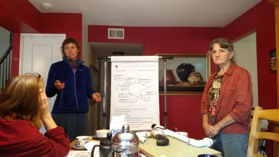
Laura Allen of Gray Water Action teaching gray water installation
We were able to visit with several owners of existing urban food gardens with chickens and help then make additions to their landscape. There were also “makers” nights where we got together and built a chicken coop for one of these gardens.
These are just some of the opportunities I would never have been given had it not been for the Benicia Land Caretakers program. And the best part was that I was able to immediately apply what I had learned and by the end of the weekend a new skill was aquired, more importantly the program provided me with the fruit of possibility.
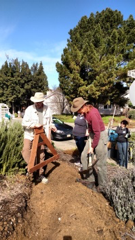
Leveling a swale
As one of the first graduates of the Land Caretakers Program, I know how much I learned from all the wonderful instructors and classes the program offers. Going through the program presented me with an enormous amount of information in various areas of organic farming and wise water usage. As the months went by I grew with each weekend class and blossomed with each completed garden installation.
As each new garden was installed, not only my knowledge grow but so did my love for what I was doing. Every weekend I saw how much these families were impacted by the gardens we were installing. When I was able to visit one of our first gardens after a year of growth I was blown away and it became apparent I needed to be even more involved with the Benicia land caretakers program.
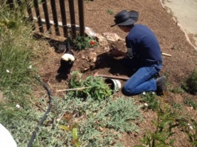
Me doing some planting
So when this new group of caretakers begins this fall I am excited to say that I have been lucky enough to pick up some additional responsibilities and will be working more with the garden installations. I am looking forward to spending time speaking with others about an amazing array of water savings programs and the potential of the urban food garden.
Because my garden roots started on a small family farm in Oklahoma I understand the value of the garden to a family. We raised organic vegetables for additional food and income for the family and sold them from the back of our pickup truck. I spent many of my before and after school hours working the gardens with my father, dutifully picking bugs from the tomatoes and potatoes and learning a keen sense of appreciation for all that grows. Little did I know that these early years on the farm would help guide my career choices later in life….
More recently, my background in landscaping has been in a more traditional role. As a supervisor at a typical “mow, blow and go” landscaper, I saw firsthand the lack of bio –sensitive business practices in the industry. We tore out yard after yard and replaced it with rocks, caring little for how we left the earth. Surprisingly, even with the potential catastrophic effects to the industry from the looming drought, many in the industry are slow to change traditional practices. I believe that a big part of caring for the land is education. If I can help someone better understand what is happening in the soil in their garden, then they will have a better appreciation of the ground beneath them and not just see it as “dirt”.
Since graduating from the land caretaker’s course, I have started my own sustainable/edible landscaping business and have helped many people start a garden of their own. Whether it’s because of space or budget, most people start small, with just a few plants or a single fruit tree. As the garden grows, so does the excitement of future fresh fruits and vegetables, with each ripe tomato it seems a dream blossoms into reality.
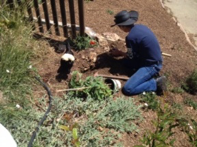 So you can see why I am so excited to start the new semester of the Land Caretakers program. I have been so lucky to take this class that I want to pass this opportunity on to others. Right now we are still finishing up the details of the program, but from what I see, the next class is going to be even more amazing than the first. The classes are the perfect mix of class room presentations and hands on training. The emphasis is on understanding the overall premise of water conservation and urban farming. The implementation of the strategy and processes for laying out the landscaping are taught in real life situations, not just from a textbook. The people and gardens work together to educate the caretakers and provide food for the families involved.
So you can see why I am so excited to start the new semester of the Land Caretakers program. I have been so lucky to take this class that I want to pass this opportunity on to others. Right now we are still finishing up the details of the program, but from what I see, the next class is going to be even more amazing than the first. The classes are the perfect mix of class room presentations and hands on training. The emphasis is on understanding the overall premise of water conservation and urban farming. The implementation of the strategy and processes for laying out the landscaping are taught in real life situations, not just from a textbook. The people and gardens work together to educate the caretakers and provide food for the families involved.
So that’s just a bit of the information about the program, hope this sparks a fire within you to come and learn in a spirit of not just sharing but doing. We all dream of a world where water wasting lawns are replaced with plants and trees that are providing for the family, but until we are breaking ground with a shovel it is just a dream. Come join us to be part of the team that is doing something to change the world….one lawn at a time!








 So you can see why I am so excited to start the new semester of the Land Caretakers program. I have been so lucky to take this class that I want to pass this opportunity on to others. Right now we are still finishing up the details of the program, but from what I see, the next class is going to be even more amazing than the first. The classes are the perfect mix of class room presentations and hands on training. The emphasis is on understanding the overall premise of water conservation and urban farming. The implementation of the strategy and processes for laying out the landscaping are taught in real life situations, not just from a textbook. The people and gardens work together to educate the caretakers and provide food for the families involved.
So you can see why I am so excited to start the new semester of the Land Caretakers program. I have been so lucky to take this class that I want to pass this opportunity on to others. Right now we are still finishing up the details of the program, but from what I see, the next class is going to be even more amazing than the first. The classes are the perfect mix of class room presentations and hands on training. The emphasis is on understanding the overall premise of water conservation and urban farming. The implementation of the strategy and processes for laying out the landscaping are taught in real life situations, not just from a textbook. The people and gardens work together to educate the caretakers and provide food for the families involved.